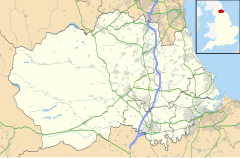Seaham Hall
| Seaham Hall | |
|---|---|
 Seaham Hall Hotel. (The water feature in the foreground is named 'Charybdis') | |
Location in County Durham | |
| General information | |
| Location | County Durham, England, UK |
| Coordinates | 54°50′53″N 1°20′42″W / 54.848°N 1.345°W |
| OS grid | NZ421505 |
Seaham Hall is now an English country house, now run as a spa hotel, in County Durham.
History
In 1815 the poet Lord Byron married Anne Isabella Milbanke at Seaham Hall. The only fruit of their marriage was Ada Lovelace, mathematician.
Londonderry
Seaham Hall was one of the many properties acquired by Charles William Vane, 3rd Marquess of Londonderry through his second marriage to Lady Frances Anne Vane-Tempest in 1819. She was one of the greatest heiresses of the time. She stood to inherit nearly 65,000 acres (260 km2). They purchased the Seaham estate in 1821 from Sir Ralph Milbanke for £63,000 [1] and developed it into what is now the modern harbour town of Seaham. This town was designed to rival nearby Sunderland. The title Viscount Seaham was created as a courtesy title for the eldest son of the marriage, who became Earl Vane on his father's death; however, when the 4th Marquess of Londonderry died childless Earl Vane inherited the Londonderry titles and his eldest son took the courtesy title Viscount Castlereagh.
However, for much of his life the 5th Marquess lived at Plas Machynlleth, his wife's home in Montgomeryshire. The family did not spend much time at Seaham but used their Irish house - Mount Stewart, which was more impressive.
Benjamin Disraeli visited Seaham Hall in 1861.
Following the death of the 6th Marquess in 1915, his son the 7th Marquess put the hall at the disposal of the authorities to use as a hospital during the Great War, [2] and it subsequently continued in use as a general hospital before closing in 1978.
Modern use
The building during the 1980s and 1990s has been redeveloped as a hotel, a nursing home and finally a luxury 5 star hotel and Spa.
In 1984, it was acquired by the Jalal family of Sunderland who worked at rebuilding, renovating and returning the deteriorated building to its former glory. The vision, determination and entrepreneurial spirit in using local skilled workforce to develop an establishment that most had abandoned was key to its survival today. It was opened in 1985 as the Seaham Hall Hotel and this remained in the hands of the Jalal family of Anglo-Arab Descent for nearly 6 years whereby the people of Seaham were given the opportunity to once again experience memories and the heritage of the building and its grounds. The Jalal's are a group of 4 sons all well-known engineers and the 9 grand-children [Cameron,Brooke,Grayson,Oriana,Kieran,Kai,Lewis,Sophie,Amelia] nee to Mrs Jean Jalal and Kusia Jalal. In 1991 it was sold by the Jalal family to Dr Mohinder Singh Mullea, a local doctor who also owned Tara House; an old people's residential home and was officially converted to an old peoples home in 1991 before subsequently returning to being a hotel.
See also
References
- Seaham Hall at Keys to the Past
- The history of Seaham at Keys to the Past
- Historic photos of Seaham Hall

